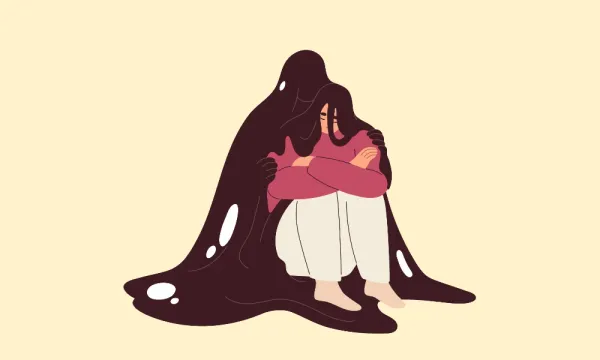The highs and lows of being romantically involved with a narcissist can feel like a head trip. Unfortunately, the effects of being caught up in their web of lies can linger long after you've slammed the door on your relationship.
Things to know
- Dating a narcissist can lead to a loss of self-identity, as their controlling behavior may force you to ignore your own needs and wants in favor of theirs. This can lead to a loss of self-confidence and self-esteem.
- Being in a relationship with a narcissist may lead to avoiding conflict and rationalizing their behavior. Over time, their over-the-top reactions may condition you to avoid conflict altogether.
- Devaluing yourself as a result of constant blame, criticism, and personal attacks is also common. This can ultimately lead to lasting feelings of self-doubt, insecurity, and a lack of self-worth if you don't seek help.
It's an undeniable fact: dating a narcissist will change you. If you’re curious to know how, here's exactly what we'll be looking at:
- Signs You Are Dating A Narcissist
- How Dating A Narcissist Can Change You
- How To End A Relationship With A Narcissist
Signs You Are Dating A Narcissist
Narcissistic personality disorder (or NPD) affects 1 in every 200 people, and up to 75% of all cases are men. Typically, narcissistic tendencies develop as a coping mechanism for childhood trauma. Plus, when a person has even one narcissistic parent, they’re more likely to exhibit narcissistic traits.
How do you tell whether the person you're dating is a narcissist or simply has a few narcissistic personality traits? Only a mental health professional can diagnose NPD, but if you're dating a narcissist, you'll notice the following red flags:
The relationship moves too fast

Narcissists fear abandonment, so they force partners to speed through major relationship stages. To reel you in, they might play on your insecurities or use manipulation tactics such as love bombing.
If they're calling you their soulmate and pressing for commitment just weeks into dating, that's a major red flag. In a healthy relationship, both partners should be able to agree on a comfortable pace.
Everything is about them
They hijack the conversation whenever you try to talk about something. If you disagree with them, they take it personally and lose it. When you can't meet their demands, they attack your character and make themselves out to be the victim.
These behaviors point to three common narcissistic traits: entitlement, a lack of empathy, and an inflated sense of self-importance.
They're extremely defensive
When challenged, narcissists can get vicious. They're sensitive to criticism and perceive any kind of feedback as a personal attack. Any form of opposition can throw them into a fit of rage or push them into an episode of malicious silence. Eventually, their emotional volatility puts you off expressing yourself.
They're insecure
Research tells us that narcissistic behavior is a way to overcompensate for low self-esteem. So it's hardly surprising that a narcissistic partner will isolate you from friends, family, and anyone else they see as a threat. They will guilt, coerce and even deceive you into neglecting the meaningful relationships in your life.

They have no empathy
Narcissists lack empathy, so they have little regard for the emotional needs of those around them. They are callous and dismissive but extremely demanding about their own needs. Even when you have genuine reasons for not being able to drop everything for them, they act out.
They gaslight you
Gaslighting is how a narcissistic partner makes you question reality. They expect you to pour everything into the relationship, but it isn’t enough. You pay careful attention to their needs and still get accused of being neglectful. When you have genuine concerns about their behavior, they twist everything until you believe you're the problem.
That isn't all. They deny doing or saying certain things and distort history. This leaves you doubting your sanity, too. With a narcissistic partner, the facts never add up, and the kicker is, it's always 'your fault.'
How Dating A Narcissist Can Change You
One of the greatest dangers of dating a narcissist and being trapped in a narcissistic relationship pattern is that you might develop narcissistic abuse syndrome. When this happens, the belief that you'll never be good enough for anyone else keeps you trapped in that particular abusive relationship.
You might also develop anxiety or depression and exhibit symptoms of post-traumatic stress.

Sometimes the worst situations can bring out the best in us. Similarly, making a clean break and working through the trauma of dating a narcissist can change you in positive ways, too.
Here are the negative and positive changes you may experience:
Your identity suffers
Giving in to a narcissist’s demands slowly chips away at your sense of self. Their controlling behavior forces you to ignore your own needs and wants in favor of theirs.
You start to second guess yourself and abandon your goals and dreams to please them. Even your preferences change to suit them. Because you're desperate for their approval, you take on their likes and interests.
As a survival mechanism, you may even do things you aren’t comfortable with, just to keep the peace. Eventually, your self-confidence and self-esteem take a significant knock.
You learn to avoid conflict
In a relationship, you should be able to talk through your issues. When dating a narcissist, legitimate concerns are often met with statements like you're "unreasonable" or "you're crazy." A narcissist will hurt you and then dismiss you for calling them out.
Soon, the fallout becomes too stressful to deal with, so you adapt by burying issues, rationalizing your feelings, or justifying their actions. Over time, their over-the-top reactions condition you to avoid conflict altogether.
You rationalize their behavior. Maybe it's something you did. Perhaps you aren't really ready for a romantic relationship.
There's no justification for emotional or physical abuse. But sadly, when a narcissist subjects you to mind games and emotional abuse, you start to rationalize or justify their behavior.
You devalue yourself

A narcissist uses everything you've said and done against you. They rely on blame, criticism, and personal attacks to break you down emotionally. It isn’t long before you internalize their harsh words and start to overcompensate. Unfortunately, the more you try to prove your worth, the more they enjoy destroying it.
You question your decisions
When you’re a victim of gaslighting, you doubt yourself. Even making simple decisions is stressful. Not being able to trust yourself works to the narcissist's advantage and keeps you dependent on them.
You become hypervigilant
In the beginning, being with a narcissist can be thrilling. Most narcissists have mastered the art of appearing charming, attentive, and loving. They shower you with gifts and make you feel special until one day, without warning, it all stops.
You’re introduced to a completely different side of them. Gone is the loving person who swept you off your feet. In their place is someone who seems to enjoy watching you squirm. You’re subjected to repeated emotional and psychological manipulation, and, as a result, you become hypervigilant.
You see your strengths as weaknesses
A narcissistic partner will praise your strengths while they’re pursuing you. Once they have you, everything they said was attractive becomes abhorrent.
Your confidence becomes arrogance. Your easy-going nature turns into a sign of unfaithfulness. Personal strengths are threats that a narcissist will gradually annihilate. As your self-belief falters, their sense of superiority increases.
Your emotional state declines

With a narcissist, you aren't allowed to feel what you feel; your emotions are invalidated. Your thoughts are inconsequential, and you're criticized until you agree with them.
As the constant emotional abuse wears you down, your emotional state declines, adversely affecting every area of your life. You become withdrawn, irritable, and moody. It’s not uncommon for victims of narcissistic abuse to resort to substance abuse, so you may even turn to drugs and alcohol to cope.
You develop trust issues
Being with a narcissist robs you of any sense of emotional security. When someone you love and trust makes you feel unsafe, you become wary of being emotionally vulnerable. You may become more guarded and less open with people because you fear being manipulated or taken advantage of again.
You sabotage yourself
A narcissistic relationship can affect your perception of yourself. Since a narcissist wants to be the only thing you can focus on, they might sabotage your personal and professional life.
If they're a vulnerable narcissist, they might feel threatened by your success and make you feel guilty about your achievements. To keep them happy, you have to downplay your strengths.
If you’re dating a grandiose narcissist, dealing with their jealousy will take up so much mental energy that you’ll have a hard time coping. When certain areas of your life take a massive hit in response, you'll believe it's because you aren't good enough.
Much to your narcissistic partner’s delight, you’ll feel like a failure and stop trying to ‘outshine’ them. Eventually, they won't even have to lift a finger—you'll start getting in your own way.
You learn how you want to be treated

On the other side of being treated horribly lies a better understanding of how you deserve to be treated. Through reflection, your ability to spot red flags improves. Your self-awareness also increases, meaning you’re more sure of what you want, need, and expect from future relationships.
You learn to avoid toxic people and situations
It takes great emotional strength to end things with a narcissist. You gain the courage to demand better from all your relationships. You also learn to prioritize your well-being and avoid toxic people and situations.
You learn to honor your boundaries
When you've dated a narcissist, your entire approach to dating and relationships changes. You learn to honor your boundaries. Emotional vulnerability will appeal to you more than superficial qualities. Plus, you’re more likely to prioritize finding a partner you feel safe with.
How To End A Relationship With A Narcissist
It takes an average of 7 tries to end a relationship with a narcissist. When narcissists aren't ready to let go, they resort to begging and pleading. Falling for their lies keeps you trapped in a vicious cycle.
As master manipulators, they make you doubt your decision by suddenly changing, tiring you out, or threatening you. It's not uncommon for them to take you back just to humiliate or leave you.
Narcissists want to be in control at all times, and you just never know when they’ll discard you for their next victim. Unfortunately, none of this is something couples' therapy can fix, so here's how to let them go for good:
Make a clean break

As narcissists use emotional tricks to manipulate any situation, it's best not to tell them you're leaving. If you give them the chance to spin things, you’ll go from wanting to escape the relationship to believing everything is your fault and staying because you feel the need to try harder.
The best thing to do is to make a clean break. Cut off all communication and make sure they have no way of reaching you. Block them on social media and change your contact details if necessary. If they know any of your passwords, reset all of your information—narcissists are known to retaliate in particularly malicious ways.
You may need to switch up your routine and start going to different places to avoid them. If they manage to contact you, establish firm boundaries and refuse to engage them. If they persist, document everything and explore legal options.
The bonds you form with a narcissist are strong trauma bonds, so you might be tempted to go back to them. Consider seeing a mental health professional to guide you through the process of letting go.
Reconnect with loved ones

Without close relationships to rely on, you risk remaining deeply attached to your narcissistic ex. Reconnecting with your loved ones will help you feel less lonely and aid your healing process.
If you haven't been in contact with them for a long time, reaching out might be scary. Unlike your ex, your friends and family will be empathetic and understanding. You might find that they had their suspicions but didn't know how to help you.
Reclaim your self-identity
To move on and rebuild your life, you need to reclaim your self-identity. This means doing deep introspection to get reacquainted with yourself. Which parts of your life did you neglect to keep the peace? What sacrifices did you make for the sake of the relationship?
If there are any interests you abandoned to keep your narcissistic partner happy, work them back into your life. Set new goals for yourself or work on old ones. Consider investing in some personal development books or seeing a life coach. All that matters is learning to listen to yourself and regaining your independence.
Be kind to yourself
Toxic relationships can lead to mental health issues. It's not uncommon to develop post-traumatic stress disorder after leaving a narcissistic abuser. Punishing yourself will only hinder your recovery, so be kind to yourself. Self-compassion will help you keep a positive mindset. It is also the key to a stronger, more stable sense of self-worth.
Work through your issues

To avoid dating another narcissist, you’ve got to work through your trauma. You’ve also got to learn how to recognize narcissistic behavior patterns. If you keep ending up with narcissists, figure out why, so you can address it.
Do you have a narcissistic parent? If you do, you might be drawn to narcissistic partners because they feel familiar. Are you the type of person who puts others’ needs ahead of their own? You might need to work on increasing your self-esteem and setting strong boundaries.
Getting professional help can empower you and provide you with a safe space to process your emotions and experiences. Talking about what you’ve been through with people who truly understand your pain can be helpful too, so consider joining a support group.
You Have The Power To Change Yourself
The negatives of dating a narcissist far outweigh the positives. The truth is, you might feel like a completely different person for a while. But there's hope—if dating a narcissist can change you, you certainly have the power to change yourself.









